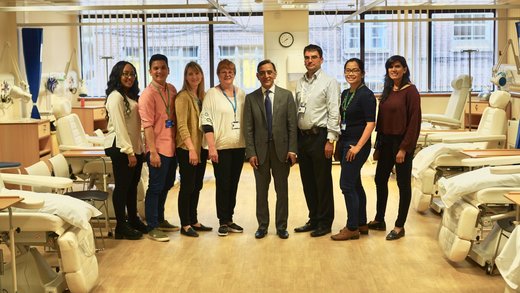The Centre for Translational Medicine brings together the organisations of King’s Health Partners and generous funding from the Guy's and St Thomas' Charity to work in partnership to improve the health of people locally, nationally, and globally.
This is through accelerating research and innovation that improves the detection, prevention, and treatment of disease.
The Centre for Translational Medicine aims to:
- address the major health burdens for local, national and global communities – and to challenge existing health inequalities;
- combine our outstanding clinical and scientific expertise to deliver excellent outcomes for patients;
- develop the next generation of clinical-academic leaders, skilled in delivering impactful translational biomedical research.
See below for our open funding calls:
Latest news from the CTM
Upcoming CTM events
-
Centre for Translational Medicine (CTM) Patient and Public Involvement and Engagement (PPIE) drop-in
Event date and time: 24 February 2026, 12:30pm to 1:30pm
Online
-
Centre for Translational Medicine (CTM) Patient and Public Involvement and Engagement (PPIE) drop-in
Event date and time: 17 March 2026, 12:30pm to 1:30pm
Online
-
KHP Centre for Translational Medicine showcase: Shaping the future of personalised health
Event date and time: 19 March 2026, 9:00am to 5:00pm
London Institute for Healthcare Engineering (LIHE)
Upcoming funding calls
This award offers two-year funding of one day a week of protected research to postdoctoral consultant or senior practitioner health professionals at King’s Health Partners (KHP) Trusts. These awards are designed to provide a part-time route for research experienced health professionals to increase their research activity and enable the formation of strong research partnerships across and beyond KHP.
This is an internal scheme open exclusively to eligible staff with substantial employment at one of the NHS Trusts in KHP.
Learn more about the first cohort of successful awardees.
Timeline for upcoming application round
Application opens: Monday 5 January 2026
Application closes: Tuesday 17 February 2026
Interviews: Week commencing 16 April 2026
Award start: September 2026
* Please note that these dates are provisional and subject to change.
Closed funding calls
Previous funding calls are listed below. Open funding calls will be listed here when available. To be the first to hear when CTM funding calls open, sign up to our newsletter.
This fellowship scheme provides up to 12 months full-time protected research time and training for pre-doctoral health professionals working in translational medicine research. During the year, fellows will develop external funding applications to support doctoral research. This scheme is open to all health professionals registered in the UK.
Funding will include salary, which will be capped at ST7 for doctors and the equivalent AfC band for nurses, midwives, and allied health professionals (NMAHPs), up to £5,000 per year for research consumables and up to £1,000 per year bursary.
Learn more about the fellows awarded in the first cohort and the second cohort.
Read about the work by some of the successful fellows from the first cohort: Marium Naqvi, Dr James Sun, and Dr Eitan Mirvis.
This fellowships scheme offers up to 24 months full-time protected research time for postdoctoral health professionals. These fellowships support fellows to apply for more substantial and competitive research funding to further their clinical academic careers. This scheme is open to all postdoctoral health professionals registered in the UK.
Funding will include salary, which will be capped at ST7 for doctors and the equivalent AfC band for nurses, midwives, and allied health professionals (NMAHPs), up to £5,000 per year for research consumables and up to £1,000 per year bursary.
Learn more about the first cohort of successful fellows. Read the KHPeople profiles of some of the successful fellows: Dr Alice Beardmore-Gray, Dr Ryan McNally, and Dr Thomas Day.
Learn more about the second cohort of successful fellows.
The second round of the fellowship application has now closed. The next application round is expected to open late 2025.
This call provided funding for the essential, often ‘hard to fund’ infrastructure to deliver high quality translational research.
Ten areas of activity have received awards, underpinning areas of clinical and academic excellence with emerging strengths and cross-cutting themes of data and diagnostics, to address the needs of patients and communities, and reduce health inequalities.
The Translational Medicine Pilot Fund is an internal scheme that offers one year of pilot funding to researchers working in translational medicine research across KHP. The funding call aims to simulate, accelerate and enhance translational medicine research, specifically the creation of pilot data.
Patient and public involvement
We have dedicated Patient and public involvement and engagement support. If you would like support in this area or if you are a member of the public or an expert by experience in the health field and would like to be part of our PPIE team please get in touch with Sarah: translationalmedicine
Training and Development
The CTM partners with King’s Clinical Academic Training Office (KCATO), who provide training opportunities and support for research-active health professionals working across King’s Health Partners. KCATO exists to facilitate world-class clinical academic training across King’s College London and our NHS partners, enabling all types of health professionals to become clinical academic leaders of the future.
KCATO’s training and development events are inclusive of all career stages and professions. Follow KCATO on LinkedIn and sign up to the KCATO newsletter to be notified about their upcoming events. You can also view and sign up to events on the KCATO SharePoint Hub.
Alongside these live training events, the KCATO Hub hosts a wealth of on-demand training materials. These cover topics including funding applications, scientific publishing, data management, patient and public involvement and engagement (PPIE), and communication. If you’re based at King’s College London, you automatically have access to the Hub via your university login. For those working at King’s Health Partners but external to the University, you can request access by filling in this form.
Centre leadership
Prof Phil Newsome is the Director of the Centre for Translational Medicine.
Prof Newsome’s research expertise encompasses cell therapies for liver disease, fatty liver disease, rare metabolic disorders, and liver transplantation, and includes both basic research and clinical trials. He has published more than 150 major research papers and is a frequent contributor to both local and national media, including advising the BBC on stories related to cell therapy.
Find out more about Prof Newsome's work.
Prof Robin Ali is the KHP Lead for Advanced Therapies.
Prof Ali has extensive experience in all aspects of cell and gene therapies from pre-clinical proof-of-concept through to GMP manufacturing and clinical trials. He also has extensive experience of commercialisation and was a founder of Nasdaq-listed gene therapy company MeiraGTx.
Prof Ali will coordinate the approach of advanced therapies across our university and NHS partners. He will enable us to coordinate our outstanding discovery science, our strong portfolio of experimental and translational research as well as our delivery of commissioned therapies.
Find out more about Prof Ali's work.
Emily is the manager for the Centre of Translational Medicine (CTM).
Emily has a background in healthcare – both clinically as a paediatric respiratory physiologist in New Zealand and then in academia, supporting various research studies.





